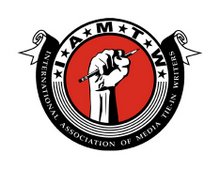We Are Tie-In Writers
We write science fiction, westerns, mysteries, romance and thrillers and sometimes all of the above. Our work embraces just about every genre you can think of, from STAR TREK to CSI, from GUNSMOKE to MURDER SHE WROTE, from DUNE to James Bond, from RESIDENT EVIL to Lizzie McGuire.
Our books are original tie-in novels, comic books and short stories based on existing characters from movie, TV series, books, games, and cartoons... or they are novelizations (books based on screenplays for movies and TV shows).
Tie-ins and novelizations are a licensed works... meaning they are written with the permission and supervision of the creators, studios, or other rights-holders of the original characters.
Well-known tie-in writers include Kingsley Amis, Kevin J. Anderson, Raymond Benson, Gregory Benford, Lawrence Block, Davd Brin, Greg Bear, Max Brand, Orson Scott Card, Leslie Charteris, Arthur C. Clarke, Max Allan Collins, Peter David, Ian Fleming, Alan Dean Foster, John Gardner, Elizabeth Hand, Stuart Kaminsky, David Morrell, Robert B. Parker, Robert Silverberg, Theodore Sturgeon, and Jim Thompson to name just a few.
Our books are published by the major publishing companies, are available everywhere, sell tens of millions of copies worldwide and regularly appear on the New York Times, USA Today, and Publishers Weekly bestseller lists... but the actual craft of tie-in writing goes largely unrecognized and is greatly misunderstood.
The International Association of Media Tie-In Writers will change all that.
Why the IAMTW? (I AM a Tie-in Writer)
Tie-writers and their work are often overlooked and under-appreciated by existing organizations like the Mystery Writers of America, Science Fiction Writers of America, and the Romance Writers of America, even though some of their most respected members work in the field. Tie-ins represent a huge percentage of the books published each year, they are enormously successful and are widely enjoyed by readers. And yet we have no organization that represents our unique business and professional interests nor acknowledges excellence in our field.
Until now. Until the IAMTW. The name itself is a declaration of pride in what we do: I AM a Tie-in Writer. We say it with pride because we are very proud of what we do and the books we write.
The IAMTW is dedicated to enhancing the professional and public image of tie-in writers...to working with the media to review tie-in novels and publicize their authors...to educating people about who we are and what we do....and to providing a forum for tie-in writers to share information, support one another, and discuss issues relating to our field (via a monthly e-newsletter, our website, and our active yahoo discussion group). Our members include authors active in many other professional writer organizations (MWA, PWA, WGA, SFWA, etc.) and who share their unique perspectives with their fellow tie-in writers.
Every major industry has an award for excellence in their field...not just books, movies, records, and TV shows. Awards are a demonstration that people take pride in their work and strive to constantly do better. Respect from ones peers is important...and, up until now, tie-in writers haven't even been able to enjoy that, despite our impressive sales. Our Scribe Awards will celebrate excellence in our craft and, at the same time, draw attention to tie-in writers among publishers, booksellers and readers.
Who Qualifies for Membership?
You do if you've written licensed fiction based on a TV show, motion picture, computer game, stage play, comic book (or strip), radio serial or other dramatic work as long as you were paid for it and it has been published (or is about to be). The membership committee will determine, on a case-by-case basis, what qualifies as "other dramatic work" (for instance, a series of books based on a toy or doll).
It doesn't matter whether you've written forty novels or one short story, whether it was published last week or thirty years ago, you qualify for membership as long as you were paid for your licensed work and it was published (or is about to be).
Fanfiction does not qualify.
Please visit us at www.iamtw.org








